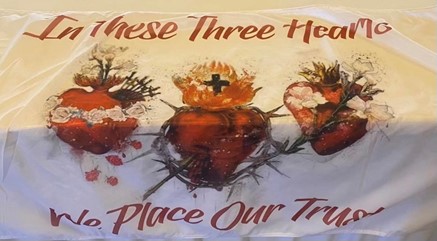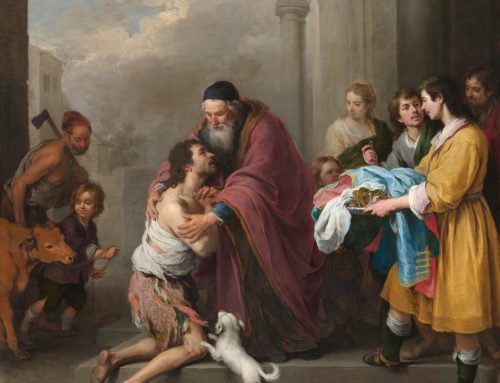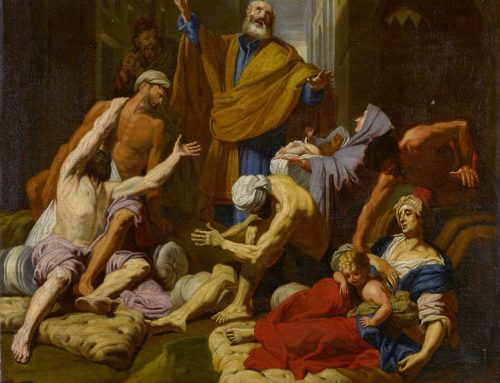
In These Three Hearts We Trust
On the new flags Father designed, there are three hearts: The Sacred Heart, the Immaculate Heart, and the Most Chaste Heart of St. Joseph. Catholics are known for their trust in and devotion to these hearts, but why do we have such a devotion, and precisely what do these hearts represent? Father has provided an extensive treatment of devotion to the Sacred Heart. Therefore, below is a brief discussion of the other two.
IMMACULATE HEART
Catholics have had a long-standing devotion to the Immaculate Heart of Mary. The devotion to the Immaculate Heart was first promoted by St. John Eudes (d. 1680 and canonized in 1925), founder of a congregation of priests, the Eudistes. St. John Eudes, a Roman Catholic French priest was passionately dedicated to fostering devotions to the Sacred Heart and Immaculate Heart. St. John Eudes had a great love for the Blessed Mother and authored many beautiful prayers and devotions to the Immaculate Heart. It wasn’t until 1855, however, that Pius IX extended the feast to the whole Church, promulgating a special Mass and office. It is no surprise that this Pius, in 1854, dogmatically defined the Immaculate Conception in his apostolic constitution, Ineffabilis Deus.
The principles for the devotion to the Immaculate Heart are the same as those that are the foundation of the devotion to the Sacred Heart, although Catholics don’t worship Mary, they venerate her (hyperdulia). The heart physically is the seat of charity and of the inner life where we consider the source of virtues. Mary always points us to Jesus. The Immaculate Heart of Mary signifies, first of all, the great purity and love of the heart of the Blessed Virgin Mary for God. This purity is manifested in her “fiat”, her “yes” to the Incarnation. Her Immaculate Heart signifies her love for, and cooperation with, the Incarnate Son in His redemptive mission. Her docility to the Holy Spirit, is what we as Christians are called to imitate. Mary’s Immaculate Heart, therefore, points us to her profound interior life, where she experienced both joys and sorrows, yet remained faithful. We as Christians, like our Mother, should ponder mysteries in our hearts, seek after Christ, walk along the via dolorosa with Him, and point others to Christ.
MOST CHASTE HEART
St. John Eudes did speak of the devotion to St. Joseph’s heart in his writings; yet we don’t find liturgical evidence of veneration to the Most Chaste Heart like we do the Immaculate Heart and the Sacred Heart in the 1600s. Nevertheless, a private devotion to St. Joseph and his Most Chaste Heart is held throughout the Church today. The devotion is based upon the pious belief that St. Joseph shares in the grace of resurrection and assumption, as does Mary, and therefore his heart is alive in Christ now, physically. St. Bernardine of Siena, St. John XXIII as well as St. Francis de Sales held this pious belief. Additionally, there are recent private revelations, which affirm this belief that St. Joseph is physically in heaven but have not yet been approved by the Church.
As the Gospel of St. Matthew delineates, St. Joseph is of royal blood, a descendant of King David and rightful heir to the throne. St. Joseph was a humble carpenter, faithfully caring for his family and ever trusting in God for guidance. Scripture tells us he was a just man, to which we can conclude his strength of character and virtue extended to all aspects of his life. Like Mary, his whole being was oriented to God, to do God’s will. St. Joseph is regarded as the most chaste spouse because he respected Mary’s vow of virginity. Tradition teaches St. Joseph to be celibate as well. Both St. Augustine and St. Thomas Aquinas identify Mary and Joseph’s union as an indivisible union of hearts. This ‘just’ man loved the Virgin and was bound to her by a husband’s love.
Regarding St. Joseph’s fatherhood, Augustine teaches, “ As [Joseph] is in chastity a husband, so is he in chastity a father…not in the flesh, but in love.[1] Pope Benedict XVI of happy memory expounds upon St. Joseph’s paternal role:
Joseph fulfilled every aspect of his paternal role. He must certainly have taught Jesus to pray, together with Mary. In particular Joseph himself must have taken Jesus to the Synagogue for the rites of the Sabbath, as well as to Jerusalem for the great feasts of the people of Israel. Joseph, in accordance with the Jewish tradition, would have led the prayers at home both every day — in the morning, in the evening, at meals — and on the principal religious feasts. In the rhythm of the days he spent at Nazareth, in the simple home and in Joseph’s workshop, Jesus learned to alternate prayer and work.[2]
Pope Leo XIII describes St. Joseph’s spiritual aspect of fatherhood, applying it directly to our lives as Catholics:
The divine household which Joseph governed just as with paternal authority contained the beginnings of the new Church… The Virgin most holy is the mother of all Christians since she is the mother of Jesus… Jesus is, as it were, the firstborn of Christians, who are his brothers by adoption and redemption. From these considerations we conclude that the blessed Patriarch must regard all the multitude of Christians who constitute the Church as confided to his care in a certain special manner. This is his numberless family, scattered throughout all lands, over which he rules with a sort of paternal authority because he is the husband of Mary and the father of Jesus Christ.[3]
St. Teresa of Avila’s devotion to St. Joseph is wise and beautiful. She writes:
I took for my advocate and lord the glorious Saint Joseph and commended myself earnestly to him; and I found that…. he gave me greater blessings than I could ask of him. I do not remember even now that I have ever asked anything of him which he has failed to grant… I wish I could persuade everyone to be devoted to this glorious saint… I have never known anyone to be truly devoted to him and render him particular services who did not notably advance in virtue, for he gives very real help to souls who commend themselves to him.[4]
St. Joseph’s role as father of the Holy Family extends to us. As Christians we venerate the Most Chaste Heart and ask St. Joseph to intercede for us, providing strength, guidance, and protection in a chaotic world. For further Magisterial reading on devotion to St. Joseph, please see Pope Leo XIII’s short encyclical: quamquam-pluries.
[1] St. Augustine, Sermons for Christmas and Epiphany (trans. Thomas Comerford Lawler; ACW 15; New York, N.Y./Mahwah, N.J.: Newman, 1952), 43, 46, 63, 64.
[2] Benedict XVI, General Audience, December 28, 2011.
[3] Francis Filas, Joseph: the Man Closest to Jesus, (The Bruce Publishing Company: Milwaukee, WI, 1946), 368-69.
[4] Terese of Avila, The Life of Teresa of Jesus (trans. E. Allison Peers; New York, N.Y., 2004), 34-35.





Leave A Comment